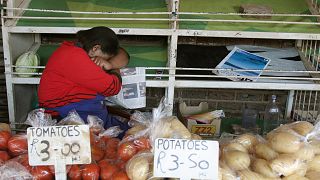Nigeria
As Nigerians struggle with a tough economic situation due to slump in global oil price, some government officials in the oil rich nation of about 170 million people are encouraging people to patronize locally made products.
One of such locally made product is the Nigerian lemonade business established six years ago with a capital of $10 but today worth $10 million.
The company, Willson’s Juice company buys truck-loads of locally grown lemons and produces between 2000 and 2500 bottles of lemonade daily.
Made In Naija…: Good News! FG Launches N10 Billion Youth Entrepren… https://t.co/K0hYi4JHao
— Khemmy Mobuse (@Kemdoy) March 25, 2016
With the recent fall in global oil price and a fall in the country’s currency, Naira, Nigeria has put up restriction in importation as a measure to boost local industries and sustain the economy.
The new measure is a good news to Wilson’s which has for years had to compete with many imported products juice products from Europe and South Africa.
“People are clamoring and hammering about devaluation of the naira, the economy is slowing down, so many things going wrong, and we just see this as an opportunity. We have seen it for years but now we believe this is the time for us to really shine,” said co-founder of Wilson’s Juice Company, Seyi Abolaji.
Nigeria’s government and the private sector are renewing a push to promote local industries and to save the economy. Business owners in the country are using the social media to promote “made in Naija (Nigeria)” ranging from handbags, footwear, clothes and so on.
The Nigerian Senate recently adopted a motion seeking the amendment of the procurement Act to compel all government agencies and institutions to give priority to locally made goods.
Senator Eyinnaya Abaribe said this will have a great impact on local industries.
“[In] The Procurement Act, which was passed by the National Assembly… there is a provision in section 34, 1, 2 and 3. There is provision for purchasing made in Nigeria goods. That one is there, but in that provision it says that the people doing the procurement may first look at made in Nigeria before looking elsewhere, and since the operating word there is ‘may’, what it means is that it now depends on the individual whether he would like to do it or not. So what we are going to do, and what we have proposed to do and we have sent to the National Assembly is to change that word from ‘may’ to ‘shall’ he said.”
MADE-IN-NAIJA PRODUCTS: Senate Moves to Compel MDAs to Patronise Indigenous goods https://t.co/lqWG53cesW via
ORDERPAPER SenatorAbaribe— Order Paper (@orderpaper) March 2, 2016
Nigeria has tens of millions of farmers but most work on a subsistence basis and live on less than $2 a day.
Poor infrastructure, unreliable electricity supply and lack of machinery and warehousing are some of the problems hindering farmers.
President Mohammed Buhari had said a strengthened agriculture sector would create jobs and reduce the over reliance on costly imports.
However, companies like Wilson’s say they are up to the task and are calling for more support and improvement in the area of infrastructure and access to finance.
“I also want to put responsibility on people like us and more of us Nigerian based manufacturers to produce better, to make Nigeria prouder through the products we produce,” Abolaji said.
With a population of over 170 million people. Some analysts say the “Buy Naija” push is about national pride and may not have any immediate effect on the economy but would diversify the economy away from oil.
Reuters













02:03
Muhammadu Buhari's legacy: higlight of his presidential tenure
01:11
World leaders express condolences over death of Nigerian ex-president Muhammadu Buhari
00:51
Nigerian ex-president Buhari dies at 82 in London
Go to video
Gaza’s scarcity of cash fuels desperation, sparks unusual trade
Go to video
“I can’t do nuttin’ for ya man”, Nigerian Minister quotes Flavour Flav in rejection of Trump policy
01:08
Dancehall superstar Shatta Wale urges young people to back President Mahama